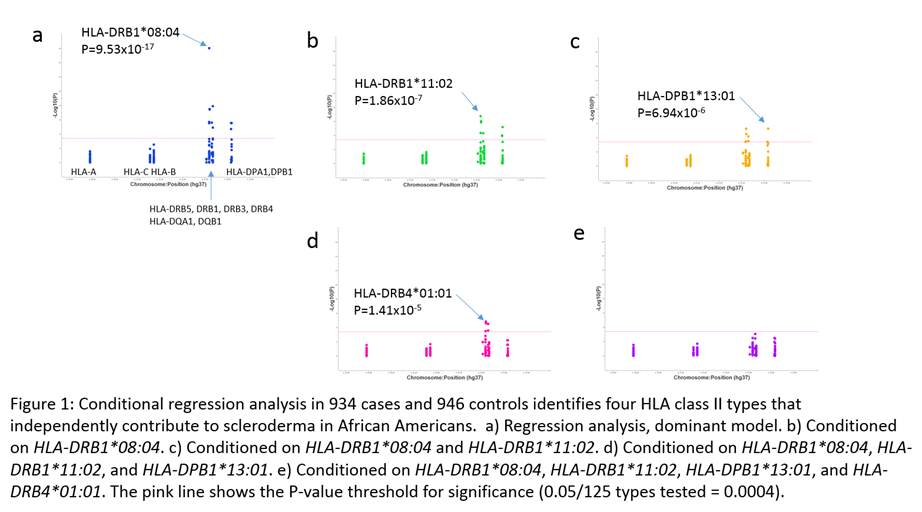Session Information
Session Type: ACR Concurrent Abstract Session
Session Time: 4:30PM-6:00PM
Background/Purpose: The Genome Research in African American Scleroderma Patients (GRASP) consortium was created to obtain a collection of African American (AA) scleroderma patients to facilitate genomic studies to identify novel genetic variants that could account for the increased scleroderma prevalence and severity in African Americans compared with individuals of European ancestry. In a companion abstract we report a genome-wide association study establishing significant genetic associations for AA scleroderma in the MHC and for TGFB3. Here we used MHC region genotypes to impute classical HLA types and analyzed their associations with scleroderma in the GRASP cohort.
Methods: SNP genotyping of 934 scleroderma cases and 946 controls was performed on the Illumina Multi-Ethnic Global array. We extracted the genotypes of 25,256 markers from 20 Mb encompassing the greater MHC region and used the Michigan Imputation Server with 1000G Phase 3 v5 reference and Eagle phasing algorithm to obtain input data for submission to the HLA*IMP:03 web server. HLA types were converted to presence or absence genotypes (PP/PA/AA) for each typed allele and disease association was determined using a dominant model. Regression and conditional analyses were performed after recoding the genotype data to 0 or 1 using a dominant model and the top 10 principal components were included as covariates.
Results: The most significantly scleroderma-associated HLA type was a predominantly African allele, HLA-DRB1*08:04, with odds ratio 2.95, 95%CI 2.26-3.85 (Figure 1). Regression analysis conditioning on the disease-associated alleles identified another African DRB1 allele, *11:02, as well as HLA-DPB1*13:01, and HLA-DRB4*01:01 as independent contributors to disease risk, but no association was found for MHC class I alleles (Figure 1). 34.6% of GRASP cases carry either DRB1*08:04 or *11:02 compared with 16.3% of controls. Analysis of 246 anti-topoisomerase antibody positive cases revealed a strong disease risk conferred by HLA-DPB1*13:01 (P=4.93×10-17, OR=4.10, 2.90-5.79). Remarkably, 30.49% of anti-topoisomerase antibody-positive cases carry HLA-DPB1*13:01, compared with 9.7% of controls.
Conclusion: The scleroderma risk-associated HLA-DRB1 types identified in the GRASP cohort differ from those reported in individuals of European ancestry. These HLA types are found at a higher population frequency than the European scleroderma risk types and therefore could contribute to the increased disease incidence or severity observed in African American patients.
To cite this abstract in AMA style:
Remmers EF, Gourh P, Boyden S, Morgan ND, Shah AA, Adeyemo A, Bentley A, Carns MA, Chandrasekharappa SC, Chung L, Criswell LA, Derk CT, Domsic RT, Doumatey A, Gladue H, Goldberg A, Gordon JK, Hsu VM, Jan R, Khanna D, Mayes MD, Medsger TA Jr., Ramos PS, Trojanowski MA, Saketkoo LA, Schiopu E, Shanmugam VK, Shriner D, Silver RM, Steen VD, Valenzuela A, Varga J, Rotimi C, Wigley FM, Boin F, Kastner DL. HLA Type Imputation in the Genome Research in African American Scleroderma Patients (GRASP) Cohort Reveals Strong Associations of African Ancestry MHC Class II Types with Scleroderma and Lack of Class I HLA Type Associations [abstract]. Arthritis Rheumatol. 2017; 69 (suppl 10). https://acrabstracts.org/abstract/hla-type-imputation-in-the-genome-research-in-african-american-scleroderma-patients-grasp-cohort-reveals-strong-associations-of-african-ancestry-mhc-class-ii-types-with-scleroderma-and-lack-of-class/. Accessed .« Back to 2017 ACR/ARHP Annual Meeting
ACR Meeting Abstracts - https://acrabstracts.org/abstract/hla-type-imputation-in-the-genome-research-in-african-american-scleroderma-patients-grasp-cohort-reveals-strong-associations-of-african-ancestry-mhc-class-ii-types-with-scleroderma-and-lack-of-class/
